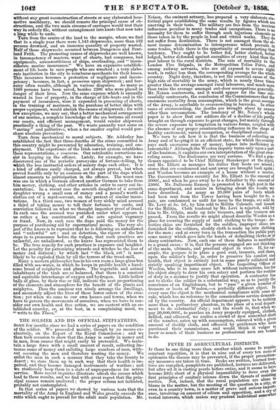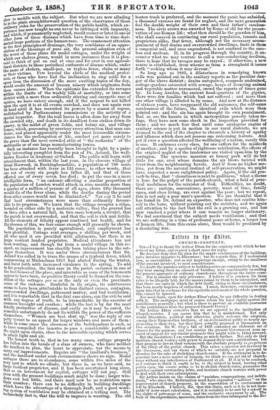FEVER IN AGRICULTURAL DISTRICTS.
Jr there be one thing more than another which seems to require constant repetition, it is that in nine out of every ten cases of epidemics the disease may be prevented, if the proper precaution- ary measures are taken in time. Books are written, learned trea- tises are compiled, pamphlets are published, lectures are delivered; but after all it is casting pearls before swine, and it seems to have become little short of a physical impossibility to force even the first principles of sanitary science down the throats of resisting rustics. Not, indeed, that the rural population are alone to blame in the matter, but the mooting of the question in a city, or even in a country town, is a matter of grave and serious impot ance, involving an amount of odium and opposition, and a cry co vested interests, which makes any prudent inclividu sal emewhat slow to meddle with the subject. But what we are now alluding n straightforward question of the observance of those to is the plai ordinary rules for the preservation of the public health, which ex- wienoe has now taught -us can never be infringed with impunity, lad which, if permanently neglected, result sooner or later in one or other form of those diseases which have from time to time deci- mama large portions of the human race. The commonest attention to the first principles of drainage, the very semblance of an appre- • tion of the blessings of pure air, the general adoption even of the worst of those plans for model cottages, under the weight of which our shelves groan, would in more instances than it is plea- sant to think of put an end at once and for ever in our agricul- tural districts to those periodical outbursts of disease which, under the name of cholera, small-pox, or typhus fever, claim so many as their victims. Few beyond the circle of the medical profes- sion, or those who have had the inclination to step aside for a apace from the discussion of the more exciting topics of the day, would credit the amount of human misery which originates from these causes alone. When the epidemic has extended its ravages within the limits of the weekly bills of mortality, or into some district with a more than ordinarily stirring and energetic race of squires, we have outcry enough, and if the serpent be not killed upon the spot it is at all events scotched, and does not again rear its head until it has recruited its powers by a season of repose, undisturbed by Parliamentary commissions or the activity of a special inspector. But the real havoc is often done far away from the crowded city, and death in its deadliest form strikes down its quarry, in the midst of green fields, and balmy air, and village homes, which, possessing by courtesy every attraction that man can desire, and placed apparently under the most favourable circum- stances for the prolongation of life, conduct yet more surely to the grave than the most crowded attic of "the rookeries" of the metropolis or of our large manufacturing towns. Such an instance has recently been brought to light by a pain- fully interesting pamphlet from the pen of ]Dr. Acland, the well- known Reader in Anatomy at Oxford. The public will learn with astonishment that, within the last year, in the obscure village of Great Horwood, in Buckinghamshire, a population of 700 souls has been attacked with fever in 125 cases ; in other words' .that one out of every six people has fallen ill, and that of those affected one of every seven has died ; to put the case in a more intelligible form, "an endemic affecting a similar proportion of the population of London would attack in nine months more than a quarter of a million of persons of all ages above fifty thousand would die of the fever alone, while the deaths during the period from other causes would not be diminished." Nor can it be said that local circunistances were more than ordinarily favour- able to its progress. We learn that the village occupies a ridge, bounded on either side by a moderate valley, that the ground has on three sides a natural fall, in two cases towards a rivulet, that the parish is not overwooded, and that the soil is rich and fertile. All t,he elements of felicity appear combined but health, and for the absence of this, we fear cause enough will presently be shown. The population is purely agricultural, and employment has been plentiful. Cottage rent averages a sbilling per week, and all who need it are provided with allotments' but there is no large resident landed proprietor. Medical attendance has not been wanting, and though far from a model village in this re- spect, an improvement has steadily been taking place in the cot- tages themselves. It was under these circumstances that Dr. Leland was called in to trace the causes of a typhoid fever, which commencing at Michaelmas 1857 had abated during the winter, and burst forth with increased virulence in the spring. To add to his perplexities, the first case in the parish occurred in one of the best houses of the place, and miserable as some of the tenements appear to have been no positive theory could be framed on the con- dition of the cottages per se as the only or even the proximate cause of the endemic. Doubtful in its origin, its continuance seems to have been attributable to four distinct causes, contagion, over-crowded dwellings, putrescent matter, and bad ventilation ; and it is remarkable that in the first case alone, can the evil be said with any degree of truth, to be irremediable by the exercise of common foresight and caution ; while the last is by far the most fatally productive of disease, and easily as it may be cured, the remedies unfortunately do not lie within the power of the sufferers themselves. "Women are best shut up," was the reply of one Petty tyrant to an appeal for larger windows and more of them ; while in some eases the closeness of the bedchambers is such, as to have compelled the inmates to pass a considerable portion of tie night upon chairs, close to the miserable opening which serves
i to admit light and a. P
The honest truth is, that in too many eases, cottage property has fallen into the hands of a class of owners who have neither the intellect to plan, the heart to appreciate,' nor the means to Carry out improvements. Repairs are "the landlord's business," and the landlord under such circumstances shows no sign. Model cottages there are in abundance, some within five miles of the ,very spot to which we allude, but there is, as we have said, no large resident proprietor, and it has been ascertained long since, that as an investment for capital, cottages will not pay. Still even with the present buildings much might be done ; larger win- dows cost but little, and there need now be no restriction upon ,17ietire. number; t ere can he no difficulty in building dwellings h have the advantage of a thorough draft, and a good work- ing system of ventilation may be obtained at a trifling cost. The melancholy factis, that the will to improve is wanting. The old beaten track is preferred, and the moment the panic has subsided, a thousand excuses are found for neglect, and the next.generaticat feel the double weight of their own and their father's careless- ness. The civic crown was awarded by Rome of old for the preser- vation of one Roman life; what then should be the guerdon of him, who shall succeed in convincing our rural population, tenants and proprietors alike, that fever, although not the necessary sworn- paniment of foul drains and overcrowded dwellings finds in them a congenial soil, and once engendered, is not confined to the care- less and unclean. If, in its progress through the country, it en- counter what we may venture to call a non-conducting medium,
i there hope that its ravages may be stayed ; if otherwise, a new centre is established, from whence as from a stronghold it issues forth "seeking whom it may devour."
So long ago as 1842, a dilatoriness in remedying known evils was pointed out in the sanitary reports as the peculiar dan- ger of the above district ; drains unrepaired, cesspools undrained, cottage-gardens saturated with sewage, heaps of decaying animal and vegetable matter unremoved, crowd the reports of times gone by. In Long Arndon, the ancient head-quarters of the gipmes, there were few families which had not suffered ; and more than one other village is alluded to by name. And now at the distance of sixteen years, have reappeared the old nuisances, the self-same carelessness of the future' the identical evils which were then
in
pointed out: and the sin again brought its own punishment. Bad as are the haunts in which metropolitan poverty takes re- fuge, they have now some cheek in the inspection provided for them ; and we much fear that until some analogous engine of sanitary science is put in motion in our rural districts, we are doomed to the end of the chapter to chronicle a history of apathy and idleness which does not possess one redeeming feature. And yet if ever a question affected the wellbeing of a nation, surely this is one. It embraces every class, for one °suffers for the misdeeds of another ; and by a species of righteous retribution, the effects of the original neglect of the landowner are visited upon him by the contagion. The spacious mansion or breezy park will do but little for one, over whose domains the air blows tainted with fever from the neighbouring hovels. And if from no higher mo- tive, yet from the natural instinct of self-preservation, we might have expected a more enlightened policy. Again, if the old pro- verb be true, that "cleanliness is next to godliness' " what a theme is here for the pulpit of the parish-church, what a field of prac- tical usefulness for the minister of God. Difficulties, no doubt, there arc; custom, convenience, poverty, want of time, family cares, and close living, are ever against the poor ; but we repeat, this is not only a poor man's question. We are thankful that it has found in Dr. Acland an expositor' who does not confine him- self to the bane without pointing out the antidote, and we again call attention to the fact that the evil is a growing one and haa now reached a point where it can remain no longer stationary. We feel convinced that the subject needs ventilation ; and that we are suffering in a time of profound peace at home, a larger loss of human life, from this cause alone, than would be produced by a desolating war.



































 Previous page
Previous page